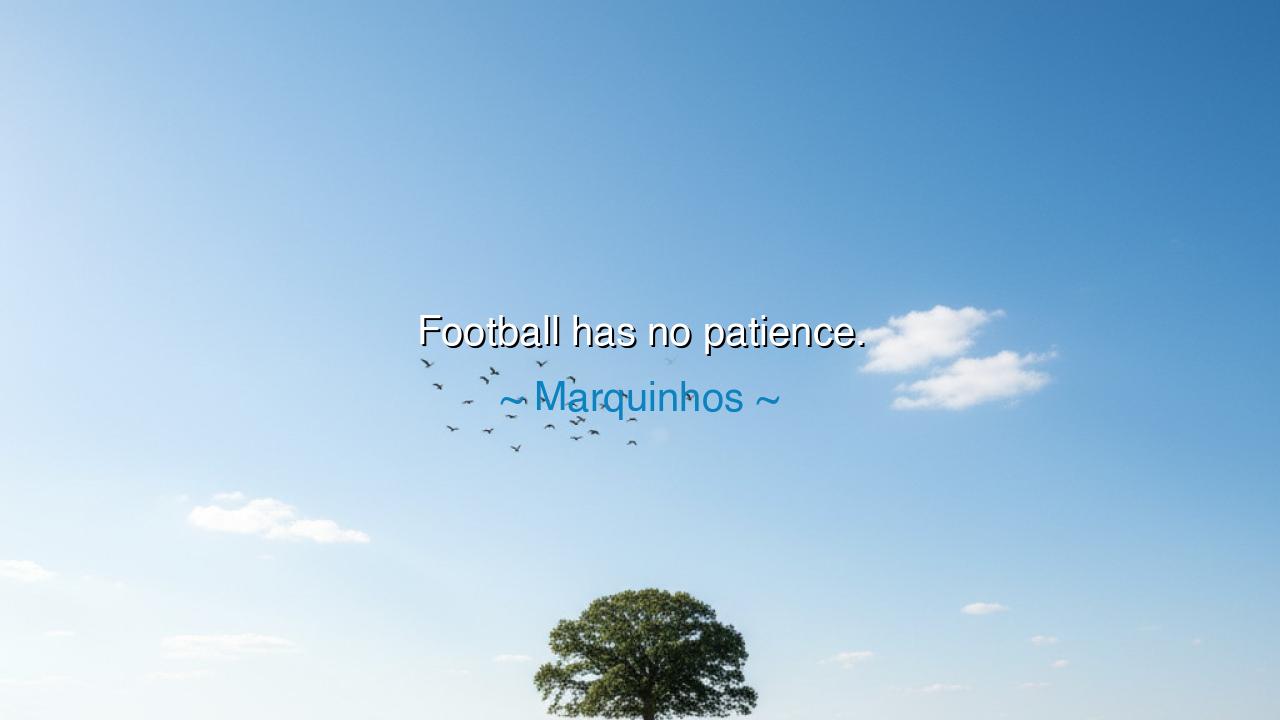
Football has no patience.






Hear the solemn words of Marquinhos, captain and guardian of the defense: “Football has no patience.” In this brief phrase lies a truth known to all who have walked upon the sacred grass of the pitch—that the beautiful game is as merciless as it is glorious. In football, time is short, chances are few, and the judgment of millions falls swiftly. It is a battlefield where triumph is celebrated in an instant, but failure is condemned just as quickly. There is little mercy, for the game demands constant proof, constant victory, constant excellence.
When Marquinhos declares that football has no patience, he speaks of the relentless pressure that weighs upon players, managers, and clubs. A single mistake may erase months of effort. A missed goal, a faltering defense, a moment of hesitation—all are judged harshly. In this world, there is no waiting for greatness to ripen slowly. The crowd roars for glory now, the club demands results now, and the media carves its judgments in stone with each passing match. Thus football mirrors life itself: in moments of intensity, the world does not wait for us to grow ready—it demands readiness in the moment.
History provides us with countless examples. Recall the tale of Luiz Felipe Scolari, who led Brazil to World Cup triumph in 2002, hailed as a hero of the nation. Yet twelve years later, after the crushing 7–1 defeat to Germany, the same man who once wore the crown of glory was drowned in criticism and scorn. This is the truth of football’s impatience: one day a savior, the next day a scapegoat. It does not wait, it does not forgive, for its heart beats in the rhythm of immediate results.
And yet, within this merciless nature lies a hidden lesson. Because football has no patience, those who endure within it must forge themselves into steel. They must learn to rise quickly after each fall, to adapt without hesitation, to cultivate inner resilience. Marquinhos himself, in moments of defeat with Paris Saint-Germain or the Brazilian national team, has stood again and again, knowing that the game offers no time for mourning. The impatient nature of football teaches the wisdom of resilience: fall seven times, rise eight.
The truth of this extends beyond the pitch. In every field of life, there are arenas where patience is scarce—business, politics, competition. In such places, one cannot wait idly for opportunity. One must be prepared, vigilant, and decisive, for the world will not always grant time to recover. The impatient nature of football is a parable for the urgency of life: to seize the moment, to act with courage, to sharpen skill until it is ready to be used at once.
But let us not confuse the impatience of football with despair. Though the game does not wait, the individual may yet cultivate patience within themselves. This is the paradox: to survive in a world that has no patience, one must build even greater patience within. The crowd may turn quickly, but the wise player knows that perseverance over years shapes true greatness. Legends like Cristiano Ronaldo or Lionel Messi endured countless criticisms, countless doubts, yet their patience with their own growth turned fleeting moments into lasting legacies.
The lesson is clear: life, like football, often has no patience for hesitation or delay. Opportunities may come but once, and the world may not wait for us to be ready. Yet if we prepare diligently, if we cultivate patience within ourselves even while the world offers none, we may endure. We may rise, we may seize the fleeting chance, and turn impatience into glory.
Thus Marquinhos’ words echo as both warning and counsel: “Football has no patience.” Remember this, O children of destiny—do not expect the world to wait for you, but ready yourself so that when the moment comes, you do not falter. Build inner strength, embrace resilience, and seize the instant, for in the impatient rhythm of life, glory belongs to those who act with courage in the now.






AAdministratorAdministrator
Welcome, honored guests. Please leave a comment, we will respond soon